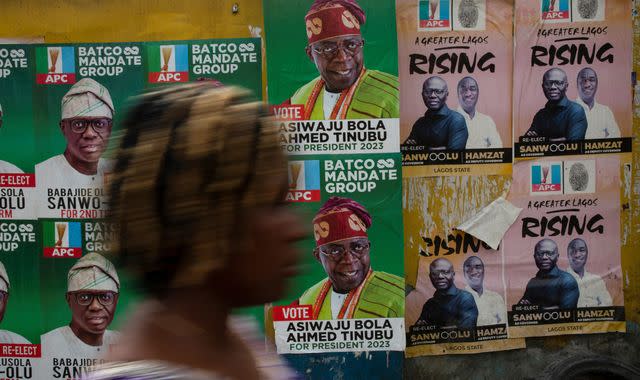Nigeria election: All you need to know as Africa's most populous nation votes for new president

There are 18 presidential candidates - 17 men and one woman - running in this year's Nigerian election. Only three of them have a realistic chance of winning.
Who's in the running to be leader?
The two favourites are ruling All Progressives Congress party candidate and former governor of Lagos, Bola Ahmed Tinubu, and the main opposition candidate Atiku Abubakar - a former vice president who represents the People's Democratic Party.
The wild card is a third candidate who has been winning the hearts and minds of young Nigerians - the lesser-known Labour Party's Peter Obi, who has been leading in opinion polls.
The incumbent president, Mohammadu Buhari, is stepping down after two four-year terms.
How does the election work?
There are more than 175,000 registered polling units across the country, manned by 1.3 million election officials.
Nigeria's next president will need to win at least 50% of total votes and at least 25% of the vote in two thirds of Nigeria's federal states, that is 24 out of 36.
If the first round of voting does not produce a clear winner, we could see an unprecedented run-off.
Could young people decide the winner?
Nigerians between the ages of 18-35 make up 39.65% of the 93.4 million people registered to vote and three quarters of all new voters.
While Mr Tinubu's influence over grass-roots politicians nationwide could likely guarantee him the state majority, the mass outpour of youth support for Mr Obi cannot be ignored. .
At 61 years old, he is the youngest candidate by a decade and is running on an anti-corruption platform, which also promises to tackle Nigeria's security crisis head on.
His reach is unlikely to be widespread enough to deliver a win but could split the popular vote enough to create a run-off for the first time in the country's political history.
When will we get a result?
The Independent National Electoral Commission (INEC) has introduced a new digital voter accreditation system which verifies voters using biometrics and uploads results.
The final ballots at each polling unit will be both manually transferred by officials to a collation centre (the legally approved method) as well as uploaded to a web portal that will be accessible to registered members of the public.
Election results usually take up to three to five days to be finalised and announced.
If no candidate meets the requirements to win, a run-off will be conducted within 21 days between the two frontrunners.
What are the issues voters are concerned about?
The Nigerian economy has taken a beating during the last eight years of incumbent President Mohammadu Buhari's administration.
Inflation has more than doubled, economic growth has slowed to 1.1% annually and oil production has nearly halved.
Fuel adulteration has given way to scarcity, as lines for petrol and diesel mark many petrol stations in major cities.
Food prices are soaring as the harvest of staples like rice were heavily impacted by devastating floods late last year.
To top it all off, a cash shortage is crippling the nation.
A Naira redesign policy, implemented by President Buhari in a bid to target illicit cash flows and vote buying, has created a deficit of currency preventing people from withdrawing funds from their bank accounts.
In this cash-based economy, life is faltering. Nigerians cannot travel to work on public transport, buy food from the market without paying tariffs on mobile money or get cash to relatives who are not digitally literate or connected to transfer services.
Frustration is building and tension is pushing people towards the polls in the hope for change but also breeding disillusionment with the political elite.
Some 7.1 million voters are registered in Lagos alone - the state with most sign-ups.
Lagos resident Jumai Olabode says: "I need to vote, it's necessary and I urge all Nigerians to actually vote, it's our civic duty. Not for yourself but for the generations to come."

 Yahoo News
Yahoo News 
